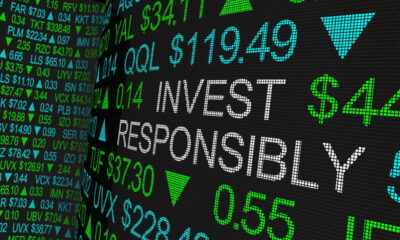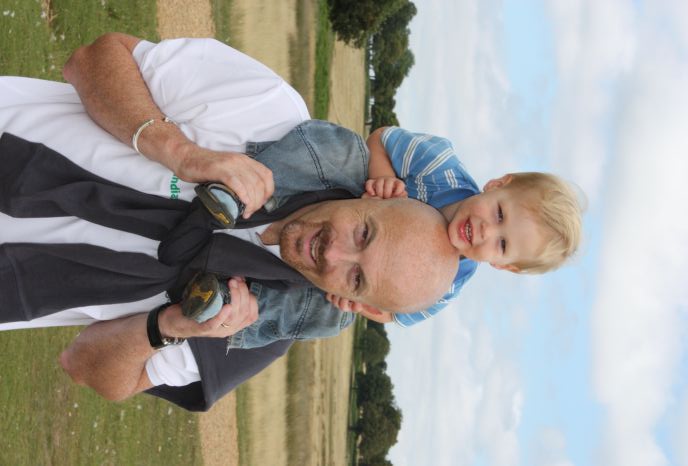
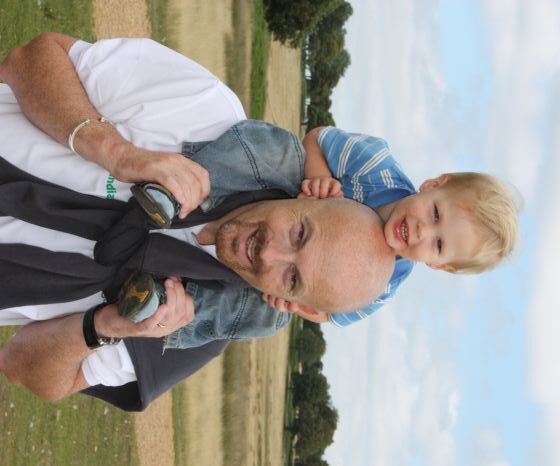
Features
“Be part of the system”: Equity Invest urges individuals to do the right thing with their money
Richard Hunter, director at Equity Invest, believes investments aren’t all about making profit. He spoke to Alex Blackburne about why people should avoid being greedy and instead be part of the ethical investment system.
Greed is a personality trait that not many people will admit to possessing. Indeed, most would bite at the even a slight suggestion of them being greedy.
Richard Hunter, director at Equity Invest, believes investments aren’t all about making profit. He spoke to Alex Blackburne about why people should avoid being greedy and instead be part of the ethical investment system.
Greed is a personality trait that not many people will admit to possessing. Indeed, most would bite at the even a slight suggestion of them being greedy.
But when it comes to investments, “90% of the population in the UK”, says Richard Hunter, “will only think of profit”.
Hunter is director of Equity Invest, independent investment advisers based in Wimbledon Village in London.
“Unfortunately”, he continues, “only a small percentage of people will say that profit is not actually the most important thing and that the most important thing is that they’re doing the right thing with their money”.
The sacrificing performance myth
As we continue to highlight on Blue & Green Tomorrow, doing the right thing means investing your money ethically, sustainably and responsibly.
And despite a number of misconceptions floating around the space, this doesn’t necessarily have to be to the detriment of your finances.
“I’ve been around long enough now to realise that there are periods in history where ethical investments will perform better, and there are periods in history where conventional investments will perform better”, says Hunter.
“It just depends when you’re investing, and the risk strategy that you take when you invest.
“I’ve had some ethical clients who have done phenomenally well and I’ve had some ethical clients who have done very badly, depending largely on the criteria that they’ve set.
“If they remove too much of the market, then sometimes we’re left with a situation where we simply cannot get the returns comparable to the conventional market.”
Blue & Green Tomorrow highlighted several ethical funds – all of which have different investment criteria – towards the end of 2011 and will continue to do so in 2012.
Hunter picks out the Ecclesiastical Amity International Fund as one of his current personal favourites.
“I think it’s a great fund”, he says.
“Rob Hepworth is a great fund manager. He keeps volatility low, which is something that my ethical clients appreciate, and he’s got a bit of cash at the moment so if we do start moving into a period of sustained recovery, he’s very well placed for that.
“If you want to take a medium term view into an ethical fund, that’s one that I would be definitely recommending.”
The “lifeboat” that was the ethical investment industry
Hunter’s own advisory career began in the conventional, or unethical, investment sector – an industry he describes as “cutthroat”.
Realising the field wasn’t somewhere he wanted to spend the rest of his working life, he was introduced to a firm called Holden Meehan. In the early ‘90s they were some of the UK’s leading specialists in ethical investments. He applied for a job at the company and got it.
“For me that was my lifeboat”, he says. “The thing that enabled me to stay in the industry and do what I wanted to do.
“I’ve always wanted to be in investment, because I believe that capitalism is a process for wealth distribution, and can do its bit to alleviate poverty.
“I’m completely committed to capitalism, but I’ve never really appreciated or enjoyed the greed element that goes along with it.
“Ethical investment allowed me to find that middle line where you can be part of the process, but you recognise that there are more things than purely making money.”
After spending nine years at Holden Meehan, Hunter left to form Equity Invest in 2001 (“’Equity’ is a pun”, he jests. “People don’t often get the subtlety of that”).
“I set up Equity Invest to look after anybody who has got a set of criteria by which they choose to live, and they’ve also got a lump of money that they want to do something with”, he explains.
“Our job is to integrate those two issues.”
And like Ian Green before him, Hunter doesn’t force ethical views upon individuals. Instead he cites his upbringing for why he is interested in the sector.
“I’m definitely not someone who tells anybody they should have ethics. And I’m not even here to disagree or agree with someone’s ethics.
“Because my parents brought me up in the Salvation Army, I grew up understanding that there are a vast amount of people who choose a set of criteria by which to live.
“I’m here to try and facilitate those within their investment planning, whatever those ethics are.
“As far as I’m concerned, tolerance is the key. That’s the mind-set of the business.”
Apart from the obvious distinctions between the ethical and unethical investment sectors, namely the industries being supported by your money, there are differences too between the individuals who make up the two counterparts.
“We’ve got some very wealthy clients who are very pleasant people”, Hunter says.
“That’s one of the real benefits of choosing to be an ethical and environmental adviser: you end up with a client bank of genuinely nice people, and that’s really unusual in my industry.”
Indeed, Equity Invest’s website showcases one such wealthy, pleasant client – former world champion triple jumper, Jonathan Edwards.
“First and foremost, I know my financial affairs are safe with Equity Invest. I would not hesitate in recommending them”, Edwards, a client of 10 years, quotes.
Hunter expands on his point.
“One of the hallmarks of an ethical client is that they are very loyal, and because there are ethics involved, and they want to integrate their ethics with their investments, they do tend to be a little bit more worldly-wise.
“They understand that investments can go down as well as up, and that it’s not all about the return.
“Profit, profit, profit is not the main objective of most of my clients.
“What they want to do is know that they’re getting a better return than if they’d left it in the bank, and be able to sleep at night because they’re not investing in anything they’re uncomfortable with.”
The system needs you
The biggest consequence of not investing ethically is more economic instability, Hunter says, echoing Jeremy Newbegin’s claims.
“If everybody’s driven just to make money, then that whole greed thing self-perpetuates, and there’ll be another massive banking crisis, because it doesn’t work.
“The whole thing will fall over. It’s about sharing.
“We’re a community and a society, and you’ve got to give in to that as well as take out of it. It can’t just be about taking.
“The only reason I’m still in this industry is that I’ve found a group of people who are prepared to give and take, because I certainly wasn’t prepared to stay in an industry where clients were simply here to take, take, take. It wasn’t right for me.”
Hunter finishes with a strong message to potential investors.
“Good capitalism is absolutely essential for the system”, he urges.
“We need people to be employed. We need people to be working, because that’s where you get dignity. We need people to be making things and creating things.
“The best way of doing that, if you’ve got a load of money stuck in a bank, is to invest it.
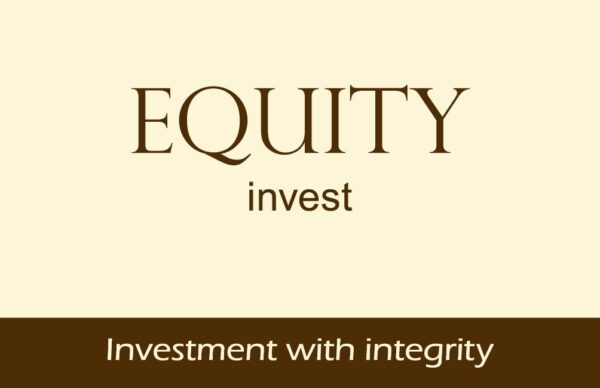 “Please be part of the system. Please be part of it because it needs you.”
“Please be part of the system. Please be part of it because it needs you.”
To find out more about investing ethically, contact Equity Invest. Alternatively, fill in our online form and we’ll put you in touch with an ethical adviser near to you.
About where he’s based
Equity Invest is located in the London district of Wimbledon, a stone’s throw away from Wimbledon Common, and less than a ten minute car ride away from the Green Financial Advice offices, previous interviewees in this series.
The area is perhaps best known for two things: The Wombles, and the Wimbledon Tennis Championships.
One of Britain’s brightest young tennis prospects, Laura Robson, was born and raised in the area, as were Laurie and Reggie Doherty – tennis playing brothers who won the men’s singles title nine times between them in the late 1800s and the early 1900s.
Raymond Briggs, illustrator of The Snowman and long-time national treasure, is from Wimbledon, whilst tragic actor Oliver Reed was also born in the area.
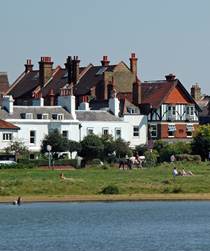 The London borough in which it’s located, Merton, is one of the greenest boroughs in the capital.
The London borough in which it’s located, Merton, is one of the greenest boroughs in the capital.
This is proven by its relatively low carbon emission levels – just 874kt in 2009 – nearly 400kt less than neighbours Wandsworth, which produced 1,207kt in the same year.
The council has taken significant steps in order to alleviate the impacts of climate change, and in March, will host a Green Energy Forum to discuss further measures.
Previous interviewees include
- Jeremy Newbegin, of the Ethical Partnership (New Forest and Guernsey)
- Lee Smythe, of Smythe & Walter Chartered Financial Planning (London and Kent)
- Julian Parrott, of Ethical Futures (Edinburgh)
- Ash Rawal, of Lighthouse Impact Ltd (Derby, Derbyshire and the East Midlands)
- John Ditchfield, of Barchester Green
- Martin Stewart, of Stewart Investment Planning (Bristol)
- Ian Green, of Green Financial Advice (London)
- Christian Thal-Jantzen, of Bromige (Sussex)


 Environment10 months ago
Environment10 months agoAre Polymer Banknotes: an Eco-Friendly Trend or a Groundswell?

 Environment12 months ago
Environment12 months agoEco-Friendly Home Improvements: Top 7 Upgrades for 2025

 Features9 months ago
Features9 months agoEco-Friendly Cryptocurrencies: Sustainable Investment Choices

 Features10 months ago
Features10 months agoEco-Friendly Crypto Traders Must Find the Right Exchange








